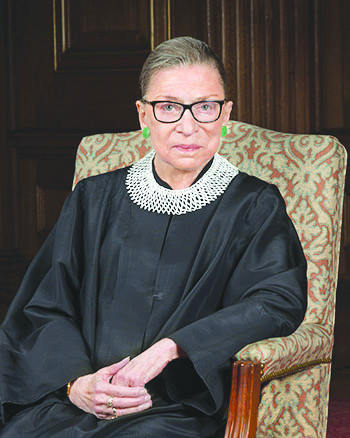
Editor’s Note: As of 10/3/20, some changes have been made to reflect proper spelling and style.
Justice Ruth Bader Ginsburg, the second woman to be appointed to the Supreme Court, recently died at age 87.
Ginsburg was born in 1933 and worked to increase gender equity across the country through interpretation of the Constitution and established law. Ginsburg served as a judge of the United States Court of Appeals for the District of Columbia for 13 years and later served as the associate justice of the Supreme Court of the United States from 1993 to 2020.
Abby Banks, political science/philosophy/economics junior, said she has always had an interest in politics and law. Banks said Ginsburg has empowered her in many ways.
“I can’t help but feel grateful,” Banks said. “Being a part of law is still a male-dominated field, and we, as women, have to take steps beyond what a male would have to take. RBG made that a little easier for us.”
Ginsburg was inducted into the National Women’s Hall of Fame in 2002, named on the “Forbes World’s 100 Most Powerful Women” list in 2004, and named one of “Time’s 100 Women of the Year” in March 2020.
Banks said Ginsburg paved the way for other women in government.
“RBG is one of those people who made it possible for women to think that even getting a degree in politics is something they can do. She made sure there was no discrimination on the basis of sex, fought for women to sign up for credit cards, and the list goes on and on,” Banks said.
Throughout her life, Ginsburg was diagnosed with five different types of cancer, including colon cancer, pancreatic cancer and lung cancer. She only missed one day of work due to her treatments.
Banks said Ginsburg was essential in the fight for gender equity.
“I’m extremely grateful for her life and the legacy she has made in the United States,” Banks said. “I can’t express my gratitude enough for what she did for women like me.”
Sarah Landrum, political science/acting sophomore, said she admires how Ginsburg fought until the very end of her life.
“I’ve always been a fan of Ruth Bader Ginsburg. I grew up in a very conservative home, but when I heard there was a woman in the Supreme Court, it was motivation for a young me,” Landrum said. “I aspire to be as dedicated and invested to working for my country and my fellow citizens and women.”
Landrum said Ginsburg opened the door for the diversity of opinions.
“For a woman of her age, she was a fantastic role model,” Landrum said. “I truly hope the lesson we learn from her is that we have to take what our role models of the past have done and do better.”
Lisi Levy, acting senior, said it is important to know about Ginsburg’s legacy.
“In the time between her death and now, I’ve learned a lot about the complex legacy she leaves. She was obviously an important figure to women’s rights, and also the first Jewish woman on the Supreme Court,” Levy said. “I also learned about some Supreme Court decisions that were controversial regarding Indigenous rights. While I can love and honor her, we can’t just glorify a person. She would want to be honored and challenged in her memory. I don’t think it’s speaking ill of the dead to challenge decisions.”
Levy said Ginsburg’s death was symbolic during the time of the Jewish new year.
“She passed on Rosh Hashana, and at first it took me aback. Someone dying on Rosh Hashana is the sign of someone’s importance. It means a lot for the Jewish community that she passed away on such a sacred holiday. It’s sad, but it’s beautiful,” Levy said. “My rabbi described it as a call to wake up and a call to fight. I thought that could not be more apropos.”
Kaylila Pasha, acting senior, said she didn’t know the impact that Ginsburg had on her until recently.
“I didn’t know until recently that women couldn’t have credit cards or could be fired for having children before the 70’s. These are things I always took for granted, and I didn’t realize it was due to Justice Ginsburg,” Pasha said.
Pasha said people must vote to uphold Ginsburg’s progress.
“If we want to see Justice Ginsburg’s legacy live on, we have to vote to ensure that the legislation she fought to pass is upheld by the Supreme Court,” she said.
Students can check their voter registration status for the Nov. 3 national election via vote.org.


Leave a Reply